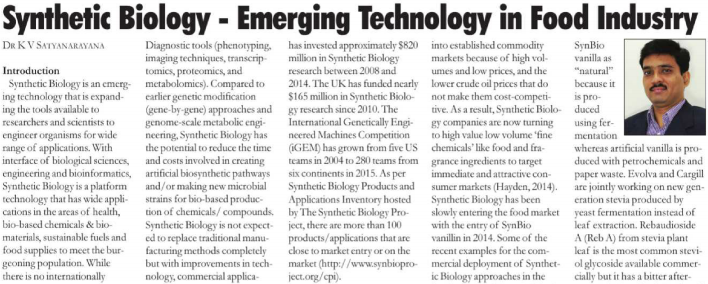The Report can be downloaded at Synthetic Biology
Synthetic Biology is an emerging technology that is expanding the tools available to researchers and scientists to engineer organisms for wide range of applications. With interface of biological sciences, engineering and bioinformatics, Synthetic Biology is a platform technology that has wide applications in the areas of health, bio-based chemicals & bio-materials, sustainable fuels and food supplies to meet the burgeoning population. While there is no internationally agreed definition of “synthetic biology,” key features of synthetic biology include the “de novo” synthesis of genetic material and an engineering-based approach to develop components, organisms and products (Convention on Biological Diversity, 2015). European Commission’s Scientific Committee on Emerging and Newly Identified Health Risks (SCENIHR) proposed operational definition of Synthetic Biology as ‘the application of science, technology and engineering to facilitate and accelerate the design, manufacture and/or modification of genetic materials in living organisms’ (SCENIHR, 2014).
The Synthetic Biology toolbox is evolving rapidly as molecular biology advances and researchers adapt and adopt tools from diverse fields. These include Design tools (Software and bioinformatics), DNA construction tools (cloning, genome-editing etc), and Diagnostic tools (phenotyping, imaging techniques, transcriptomics, proteomics, and metabolomics). Compared to earlier genetic modification (gene-by-gene) approaches and genome-scale metabolic engineering, Synthetic Biology has the potential to reduce the time and costs involved in creating artificial biosynthetic pathways and/or making new microbial strains for bio-based production of chemicals/ compounds. Synthetic Biology is not expected to replace traditional manufacturing methods completely but with improvements in technology, commercial applications based on this approach are likely to increase in the coming years.
Globally Synthetic Biology has advanced rapidly in the last decade. According to Synthetic Biology Project at the Wilson Center (USA), the United States has invested approximately $820 million in Synthetic Biology research between 2008 and 2014. The UK has funded nearly $165 million in Synthetic Biology research since 2010. The International Genetically Engineered Machines Competition (iGEM) has grown from five US teams in 2004 to 280 teams from six continents in 2015. As per Synthetic Biology Products and Applications Inventory hosted by The Synthetic Biology Project, there are more than 100 products/applications that are close to market entry or on the market (http://www.synbioproject.org/cpi).
Synthetic Biology in food industry
The early interest of Synthetic Biology (SynBio) companies was in the area of new biofuels and alternatives to petroleum-based products. However, the companies are finding it increasingly difficult to break into established commodity markets because of high volumes and low prices, and the lower crude oil prices that do not make them cost-competitive. As a result, Synthetic Biology companies are now turning to high value low volume ‘fine chemicals’ like food and fragrance ingredients to target immediate and attractive consumer markets (Hayden, 2014). Synthetic Biology has been slowly entering the food market with the entry of SynBio vanillin in 2014. Some of the recent examples for the commercial deployment of Synthetic Biology approaches in the food sector and those in lab trials are listed in Table 1.
Table 1. Synthetic Biology products/ pipeline for food industry
|
Product (Application Category) |
Developer (Partner) |
Current Status |
|
Resveratrol (Dietary supplements) |
Evolva |
Launched in 2014 |
|
Vanillin (Flavour and fragrance) |
Evolva |
Launched |
|
Nootkatone (Flavour and fragrance) |
Evolva, |
Launched |
|
Valencene (Citrus Flavouring) |
Evolva, |
Launched in 2015 |
|
Stevia (Sweetener) |
Evolva (Cargill) |
Scale-up |
|
Saffron (Flavour and fragrance) |
Evolva |
Development |
|
Animal-free milk (from Yeast) |
Muufri |
Lab trials |
|
Real Vegan Cheese (milk from yeast) |
Counter Culture Labs & BioCurious |
Lab trials |
|
Animal-free egg white |
Clara Foods |
Lab trials |
Source: Company websites
The Synthetic Biology component adopted by most SynBio companies is the genetically- modified organism to be used in fermentation process. In the past, one of the major challenges for adopting this approach for producing flavours & fragrances compounds was scaling up the production. The recent successes of companies such as Evolva, which adopted modified yeast as the platform, suggested these challenges could be overcome. The SynBio companies are advocating this technology as more sustainable than traditional methods such as synthesising flavours from petrochemicals, or extracting smaller quantities of compounds from plants grown on fields or raising animals.
Evolva is even positioning its SynBio vanilla as “natural” because it is produced using fermentation whereas artificial vanilla is produced with petrochemicals and paper waste. Evolva and Cargill are jointly working on new generation stevia produced by yeast fermentation instead of leaf extraction. Rebaudioside A (Reb A) from stevia plant leaf is the most common steviol glycoside available commercially but it has a bitter aftertaste. Reb D and Reb M, devoid of the lingering aftertaste, make up less than 1% of the leaf and so not feasible to extract from the leaf. The fermentation process makes feasible Reb D and Reb M production on a large scale at a lower cost. It is estimated that Stevia leaves account for approximately 60-70% of the cost of stevia extract production.
How will consumers uncomfortable with Genetically Modified Organisms (GMOs) respond to SynBio compounds? The Non-GMO Project, an organisation offering a third-party non-GMO verification programme& voluntary standard, has already declared that ingredients produced via ‘Synthetic Biology’ will not qualify for the Non-GMO Project Verified stamp.
In most of the SynBio products being marketed, the consumers are not aware that genetically- engineered microbes with artificial biosynthetic pathways are used in producing these compounds. The “engineered organisms” are only used in the fermentation process (natural brewing technology) as a raw material to help make the final product and are not present in the final products. So the current regulations governing the use and labelling of GM organisms do not apply to fermented & purified ingredients. Moreover, these compounds may not possess health risks as the product is extracted and quality assessed for purity.
Regulations for SynBio products
There is growing concern that products based on Synthetic Biology are entering or at the verge of entering markets without an established regulatory framework for safety assessment of health and environmental risks. As of now, there are no specific laws to regulate products derived from SynBio organisms/ processes. Evolva’s resveratrol has Self-affirmed Generally Regarded As Safe (GRAS) status in the United States and Novel Foods Authorization for use in Dietary Supplements in the European Union. Vanillin from Evolva has been determined safe by the Flavor and Extract Manufacturers Association expert panel (FEMA GRAS).
European Commission’s Scientific Committee on Emerging and Newly Identified Health Risks (SCENIHR), Scientific Committee on Consumer Safety (SCCS) and the Scientific Committee on Health and Environmental Risks (SCHER) have decided that for current and short-term, Synthetic Biology developments, risk assessment criteria, methodology and risk management systems established for GMOs and pathogens provide a good basis for addressing potential risks (SCENIHR, 2015).
There are several ongoing initiatives for a common approach for Synthetic Biology regulation which include the Joint Conference of the OECD, the UK Royal Society and the US National Academies of Science. Recently in 2015, an international forum for risk assessment and policy debates on the governance of Synthetic Biology took place under the provisions of the United Nations Convention on Biological Diversity. It is not yet clear how principles underlying the current Genetically Modified Organisms (GMO) regulatory framework, such as the case-by-case risk assessment, the comparative approach, the step-by-step process and the precautionary principle, will be used for Synthetic Biology.
The substantial equivalence principle may be less suitable for biosafety assessments in Synthetic Biology. With the use of complex genetic circuits designed by Synthetic Biology, it will be difficult to find a conventional comparator to assess the organisms or products and to predict the possible interactions of various biological parts (genetic circuits, DNA fragments etc.) within host cells and with other cells, if released into the environment. The Convention on Biodiversity is addressing issues related to impacts of Synthetic Biology on biodiversity and genetic resources. There is a need for development of relevant regulatory frameworks for SynBio products, which should also address whether the product should be labelled as a Synthetic Biology one. The success of this technology will require embracing transparency and engaging all the stakeholders. It is crucial to communicate with the public on the benefits and risk management of Synthetic Biology and try to implement appropriate measures to eliminate, reduce, and manage the risks.
Synthetic Biology in India
Synthetic Biology research in India is in nascent stages with few public institutes carrying out research in the area of bioenergy and biochemicals. The private sector involvement in India is limited to few companies like Evolva Biotech Pvt. Ltd. As part of the Twelfth Five Year (2012-2017) Plan, a Task Force on Synthetic Biology and Systems Biology Resource Network (SSBRN) was constituted. The Task Force identified biofuels, bioremediation, biosensors, food and health as potential application areas for systems and Synthetic Biology. However for foods, the Task Force indicated low probability for successful deployment at 10 years citing technical as well as regulatory barriers. According to the Task Force, safe and efficient promotion of Synthetic Biology initiatives would require the regulatory frameworks developed around it to be looked in conjunction with other instruments such as Convention of Biological Diversity, TRIPS, Cartagena Protocol and others.
India does not yet have a precedence of SynBio product for regulation, but it is high time for Indian regulators to determine the pathway to approve these products within the purview of FSSAI. According to FSSAI’s document on “Operationalizing the Regulation of Genetically Modified Foods in India, food safety assessment of GM foods (viable and processed) and approval for commercial release of GM foods (processed) will be the responsibility of FSSAI. Environmental risk assessment of GM organisms and approval for commercial release of GM foods (viable i.e. LMOs) will be the responsibility of Genetic Engineering Approval Committee (GEAC). Whether the SynBio food products in India will also be assessed considering the existing safety & risk assessment criteria and methodology established for GMOs? The SynBio food ingredients released elsewhere have been cleared as pure extracted ingredients from genetically-modified organisms. How will the imports for these SynBio ingredients be regulated in India? Effective regulatory regime should be developed so that the issues related to regulation do not result in controversies and litigations.
Conclusion
The fact that Synthetic Biology has been used in making an ingredient doesnot mean it is unsafe, unnatural and unregulated. The SynBio based products may be identical to the compounds made using traditional methods or as extracted from plants and hence might be safe for consumers. Describing the process as ‘natural brewing technology’ should not exempt the manufacturers from disclosing that a Synthetic Biology approach has been adopted in making an ingredient. Safety aside, the consumer should know the process involved in making the ingredient and be given a choice to opt for it. The full potential of Synthetic Biology as a new tool in commercial biotechnology can be realised only if there is transparency and open information exchange among all the stakeholders involved.
References
Hayden, E.C. (2014). Synthetic-biology firms shift focus. Nature 505, 598. Planning Commission (2011). Report of the Task Force on SSBRN, 12th Five Year Plan. SCENIHR (Scientific Committee on Emerging and Newly Identified Health Risks), SCCS (Scientific Committee on Consumer Safety), SCHER (Scientific Committee on Health and Environmental Risks), Synthetic Biology I Definition, Opinion, 25 September, 2014. SCENIHR (Scientific Committee on Emerging and Newly Identified Health Risks), SCHER (Scientific Committee on Health and Environmental Risks), SCCS (Scientific Committee on Consumer Safety), Synthetic Biology II – Risk assessment methodologies and safety aspects, Opinion, May 2015. Secretariat of the Convention on Biological Diversity (2015). Synthetic biology, Montreal, Technical Series No. 82, 118 pages.
Author Dr K V Satyanarayana


